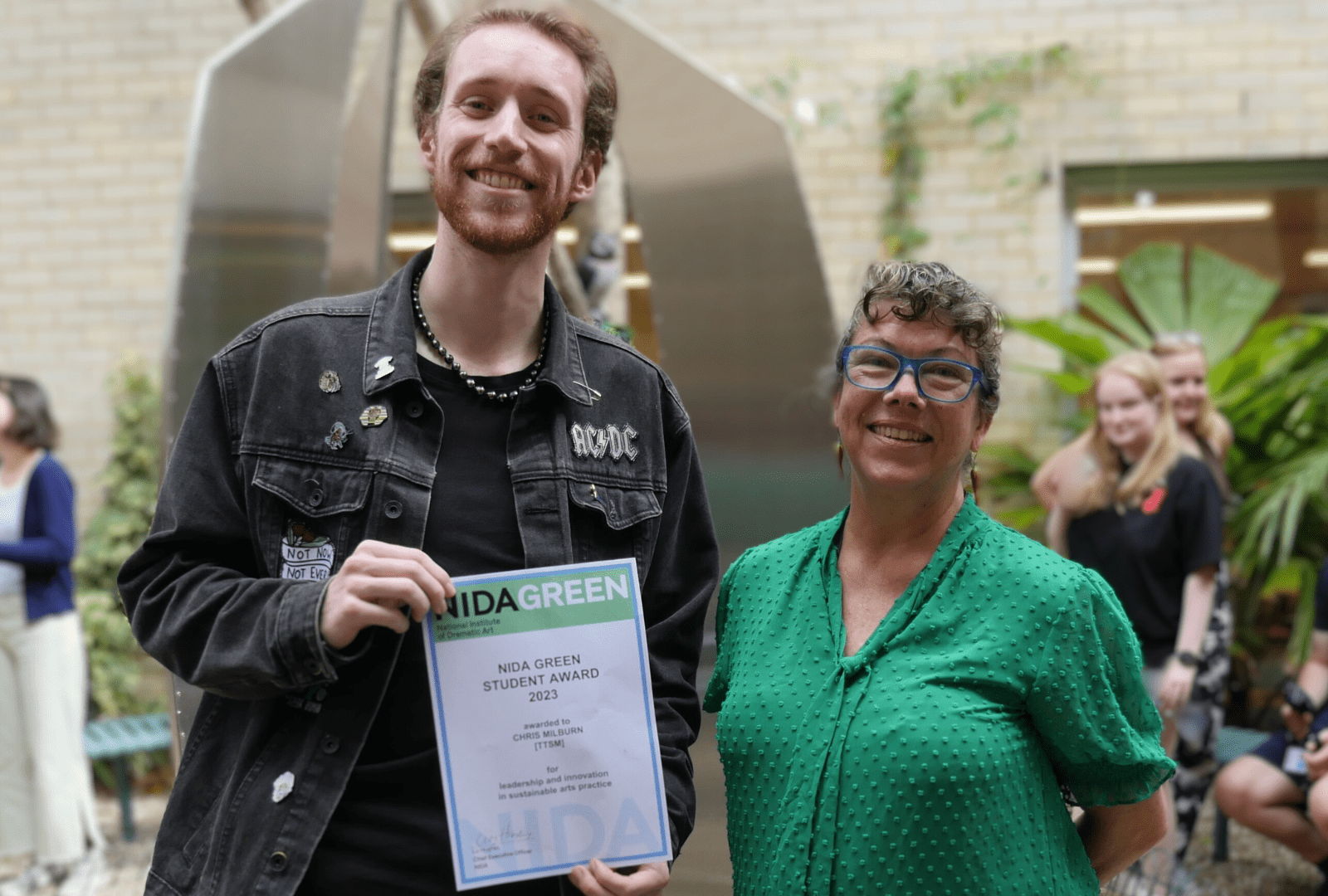As NIDA’s Sustainability Manager, Imogen Ross has developed an environmental strategy within NIDA’s educational and operational frameworks. In this interview, she discusses the NIDA Green Plan which integrates sustainability into the curriculum and encourages students to examine the environmental impact of productions. By providing future industry leaders with the knowledge and skills to implement sustainable practices, NIDA aims to foster a new generation of environmentally conscious creatives.
What is NIDA Green and what are the goals of the NIDA Green Plan?
NIDA Green is an environmental sustainability strategy that supports NIDA’s goal to achieve carbon neutrality by 2030. The NIDA Green Plan is the result of extensive consultation with staff and students, industry practitioners and international partners. It provides NIDA with a clear roadmap to achieving ‘greener’ outcomes across NIDA’s teaching curriculum, student-led productions, staff teams and our building infrastructure and operations. The strategy equips a new generation of industry practitioners with the skills and practices to create positive change in their future workplaces, across Australia and globally.

How are sustainable practices being implemented in the NIDA curriculum?
In 2023, NIDA partnered with the Performance + Ecology Research Lab (P+ERL) at Griffith University, led by Dr Tanja Beer, to embed environmental sustainability learning across all NIDA degree courses: Bachelor of Fine Arts (BFA), Masters of Fine Arts (MFA) and VET Diploma programs. P+ERL and NIDA Course Leaders worked together to identify and create learning content to inform current thinking and practices in sustainable production across theatre, screen and live events. NIDA’s 2024 curriculum now includes bespoke class exercises, resources and case studies that address the specific environmental sustainability opportunities and challenges of individual NIDA disciplines including Acting, Costume, Cultural Leadership, Design, Directing, Dramatic Writing, Specialist Make-up, Musical Theatre, Props and Effects, Technical Theatre and Stage Management, and Set Construction Technologies. The new curriculum is currently being rolled out for all new students enrolled in NIDA BFA, MFA and Diploma programs and being shared with existing students.
One example of embedded sustainable practice is in the Common course that all first-year students complete together. Sustainability in all its interconnected forms (environmental, personal, financial and social) is discussed, applied to performing arts and then played with in gamification. Caring for Country is introduced conceptually from the beginning by NIDA’s inspiring First Nations educators, and students create new ‘games’ that explore modes of sustainability, encouraging the players to think about how their individual choices impact on bigger social and environmental systems.
Making live productions is the key element in how NIDA students hone their craft. As part of NIDA’s commitment to embedding environmental consciousness into all aspects of student learning, we have been focusing on developing Green Production strategies, using the Theatre Green Book (TGB) as a guide.
Tell us about the Theatre Green Book (TGB) and its significance.
The Theatre Green Book (TGB) was initially developed in the UK and since being launched in 2020, continues to have a major impact on the live performance industry. Internationally it is considered a key resource to support the sector transition towards sustainable practices and is being translated into multiple languages. It provides a clear easy-to-apply framework to support effective collaboration between departments within a theatre company. NIDA is an early adopter of the TGB and uses it as a sustainability strategy in all student-led productions. Our first TGB case study was Blood Wedding in 2022, followed by the bold decision to ask a quarter of NIDA’s productions in 2023 and half of NIDA productions in 2024 to meet the TGB Baseline. NIDA’s goal is to incrementally reduce the carbon footprint of student-led productions by embedding creative circular economy principles of Reduce, Re-use and Recycle.

How is NIDA adopting the sustainable production practices outlined in the TGB?
For both June and October seasons, NIDA production teams are provided with briefings and online resources to guide sustainable production practices. We currently use a bespoke waste acknowledgement form called the WasteTracker (developed by Chris Milburn, a third-year TTSM student for Sweeney Todd in 2023) to track and document all items that come into and leave a production. By capturing this qualitative data, teams easily see what percentages of waste are created, the amount of stock that is regularly re-used and needs to be stored, selected materials, and the different waste streams being utilised post-production.
In 2024 we have 5 student volunteers taking on the role of Environmental Sustainability Coordinator (ESC). They play an active advocacy role in production meetings, celebrating Sustainability Wins and supporting the inevitable Sustainability Challenges. The ESCs encourage student supervisors to engage with the WasteTracker, and forefront environmental concerns in each production.
Can you tell us about the data you are gathering in Green Productions?
The TGB Baseline asks a production team to reduce new items brought in by 50% and to creatively reuse or recycle at least 65% of all items at the end. Last year, we achieved TGB Baseline with two out of eight of our productions and this year we are aiming for at least half the season to reach Baseline. Next year it will be even more! We can use the data to undertake further high-level carbon calculations. As NIDA continues to track and monitor student productions over subsequent seasons, the data and insights collected will help to inform NIDA’s policies, training, systems design, and budgets.
What are some of the ways that the buildings and operations are influenced by NIDA Green?
NIDA’s Facilities team are very much on board with providing waste stream management and energy-efficient solutions to ensure NIDA’s carbon footprint is kept low. Since 2020, they have added over 325 solar panels to the roof, significantly reducing the energy draw of the air conditioning units. LED lighting technology is replacing incandescent globes in all offices, public spaces and corridors, and most recently, NIDA won a grant from the NSW state government to help the transition toward LED in our theatres. In February 2024 the NIDA recycling hub was opened with over 12 different recycling waste streams available, incl. soft plastics, batteries, globes, metals and polystyrene. Waste management is a constant shifting landscape involving regular education of all staff and students. Where do things come from? Where do they go? Do they go into a hole in the ground or can we do better than that?
What are some of the upcoming NIDA Green events?
Our fabulous NIDA Green Team is made up of over 12 staff and students and meets monthly on-site. The Green Team is a way for people to get involved in a sustainable culture shift, suggest actions across campus and propose all-school initiatives. One such initiative is Mending Mondays – a community-connected lunchtime session that encourages staff and students to mend clothes together, sharing skills and stories. On June 5, the Green Team will mark World Environment Day with a Clothes Swap, to encourage the re-use of clothing and accessories. During Open Day, on June 15, the Green Team will showcase some of the games developed by students in the Common subject, teach basic mending techniques and use upcycled magazines to create costume designs with families visiting on the day.

Imogen Ross is an accomplished theatre and live event designer with over 30 years of experience in Melbourne, Sydney, Perth, regional NSW, and London. She is the co-author of ‘Performance Design in Australia’ and created short courses to introduce set and costume design at the HSC level. Passionate about eco-conscious design, she now serves as the Environmental Sustainability Manager at NIDA, where she promotes sustainable practices and circular economy strategies to reduce the institution’s carbon footprint and inspires the next generation of Australian storytellers to be environmentally conscious.

